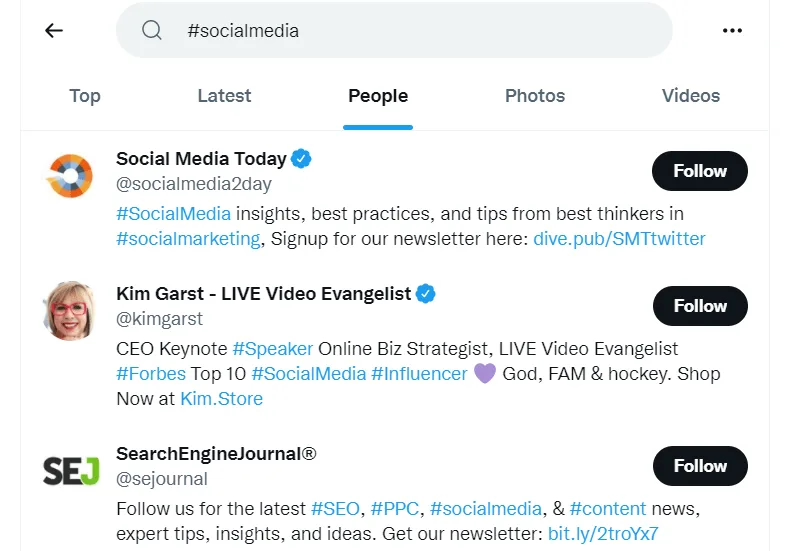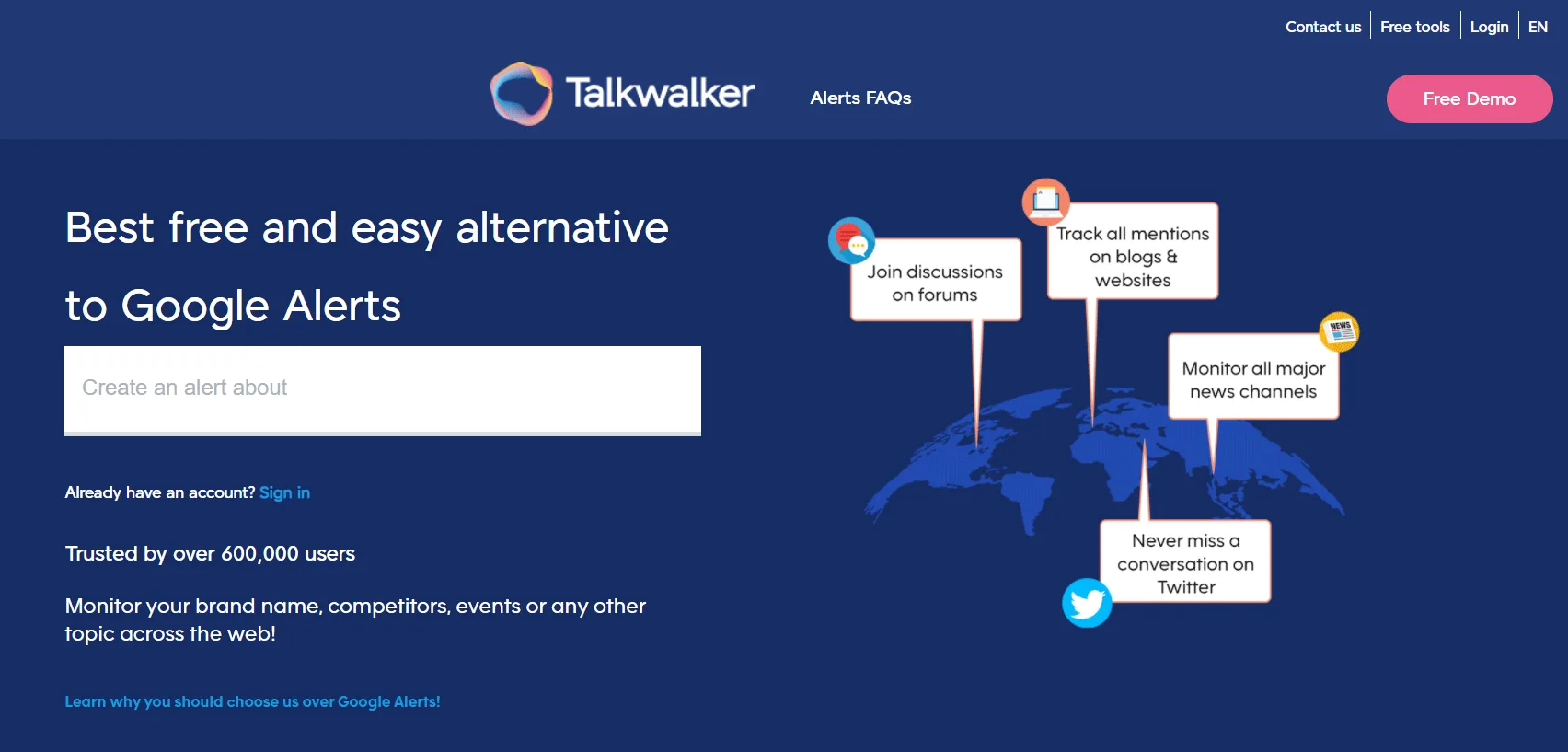The social web is not just a marketing channel, it can also help you with customer service, reputation management, market research and much more. This is exactly what social media monitoring is for. In this article, I’ll explain what it does, how to get started and how to find the right tools.
What is social media monitoring?
Social media monitoring keeps you up to date with what is being said about you, your company and your products on the social web. You can also keep an eye on this for your competitors or for your subject area and industry in general. You can draw various conclusions from what you learn from social media monitoring and use the knowledge gained in different ways – more on this in a moment.
In any case, social networks are not just a channel for sending, but also for receiving. Once you have chosen the right social media platforms for you, it’s not enough just to post there regularly. You also want to be aware when others publish something that is important to you.
So that we know what we are talking about, I would like to differentiate the term “social media monitoring” from a few others:
- Social media analytics: This is about visualising the success of your activities using figures. As a rule, social networks offer statistics themselves. Third-party providers try to summarise these as clearly and uniformly as possible in one place and collect their own additional data.
- Social media intelligence: This is where the figures collected with analytics are analysed and conclusions are drawn.
- Social media management: This refers to all activities relating to your social presence. In other words: how you organise yourself, who is involved, etc.
There is also the term “social media listening”. This is used and defined in very different ways. Some see it as a sub-item of social media monitoring, whereby it is solely concerned with statements about one’s own company and their sentiment (“sentiment analysis”, for example categorised as positive, negative or neutral).
Others, however, see social media listening as a generic term and social media monitoring as a sub-discipline. Yet another definition sees them as a tandem: Monitoring provides the data, listening derives the consequences. And last but not least, they are often used as synonyms.
Content marketing for advanced users: The 6 most important levers
Discover how to optimize your content marketing to reach the right audience, build trust, and achieve long-term success.
As is so often the case in the digital world, technical terms are used in different ways. In this respect, you always have to look closely at what is actually meant in each individual case. But please don’t let this confuse you. This article is about being informed about relevant statements and posts online – and responding appropriately.
What can you use social media monitoring for?
Before you go to the trouble of monitoring, you will certainly want to know what you get out of it and how you can use it. This is also important because the following possible areas of application each have a different focus, require different tools and different approaches:
Customer service
Even if you don’t explicitly offer people the opportunity to contact you or your company via social media, it will still happen. You should respond to such requests promptly. This is usually quite feasible, as users will mention your company directly in this case, for example via Mention. Or because they leave a comment under a post.
You can see this in your notifications – as long as you don’t just see social media as a channel for sending and pay attention to it. There are third-party tools that bring all these reactions and signals together in one place.
Reputation management and crisis communication
Your customers will also talk about you on social media in general – hopefully positively, but certainly also negatively at times. In both cases, you want to know about it as quickly as possible. In the case of praise, you may want to spread it yourself (share, retweet) and thank them for it. In the case of criticism, you want to show that you take the person seriously and are taking care of the problem. Critical comments in particular can otherwise quickly get out of hand (“shitstorm”).
Market research
Social media networks are perfect for using actively or passively to gain insights into your industry. This happens actively, for example, when you ask your fans and followers about new product ideas or invite them to be beta testers. Passive is when you use social media monitoring to find out what questions and problems a potential target group has.
Can you respond to this with new or customised offers? Should you include it as a topic idea in your content marketing? What is being said about your competitors? What strengths and weaknesses do they have and what can you derive from this for yourself?
Lead generation
If you follow up on comments about your company and your products or your industry in general, this can result in new leads. In other words, you convince a prospective customer who may still be hesitant to take a closer look at what you have to offer. Of course, you shouldn’t go about this with flat sales slogans, but above all show your helpful and trustworthy side.
Basics of lead generierung
In order for your WordPress agency or your work as a freelancer to last, you need to constantly expand your customer base. We’ll show you how to acquire, convert and retain new customers. Simply download our comprehensive e-book on customer acquisition.
Identify influencers
If you follow the conversations about your subject area or your company on social channels, you will come across some profiles again and again. Such multipliers are often called influencers. They can be interested private individuals or respected experts.
Once you have identified these people, they can be used to build a relationship (influencer relations). Or perhaps even for joint advertising measures (influencer marketing). Either way, it is helpful to know these profiles, as they obviously have a significant influence in the field of your products or services.

Optimise marketing
Social media monitoring also helps you to learn a lot about your target group, which can have a positive impact on your marketing activities. You may find out which social network is actually the most important for your target group. Or you can see which campaigns are well received – beyond the bare figures.
When it comes to social media monitoring, the first two sub-points are often mentioned: You want to help your customers and you want to be informed in good time if a “shitstorm” hits you. Monitoring can have direct economic effects and support both marketing and sales. Whether this is possible in your industry and with your offers depends on your individual case. But it’s worth considering.
How do you take the first steps?
My favourite motto is always: start small first and then expand if necessary. Because if you try to implement social media monitoring perfectly and seamlessly straight away, you will probably be put off. After all, this means either a huge amount of work or considerable costs for you. Instead of abandoning it altogether, I think it’s better to just get started.
Firstly, you should be clear about what exactly you want to keep an eye on. You create a mental or ideally written list of terms. These keywords can include names: your own name, that of the company and the names of products or offers. Think about typos and misspellings. You may want to add the names of competitors and see what conversations are taking place there. Another tip: Also think about terms that are part of customer service, such as “help”, “not working”, etc.
Planning WordPress projects: From requirements to implementation
We spoke with Ben Hutchison-Bird from NINE Brackets about key strategies for translating client needs into successful WordPress and WooCommerce projects.
You could also add keywords that belong to your industry to this list. The more general they are, the more results you will get. And finding the interesting information in this generalised noise is difficult. That’s why you’ll want to narrow down your keywords by looking for more specific terms, for example. An example: You’re implementing online shops with WooCommerce. Instead of looking at everything that is said about “online shop”, you would rather use “WooCommerce”. You could also keep up to date with typical WooCommerce problems and questions.
In the simplest case, you can go through your list of terms manually. Social networks usually offer you a search function. Keywords and hashtags are also very common. On Instagram, you can even follow hashtags in the same way as a profile. This is already a simple form of social media monitoring.
Of course, searching social networks in this way only gives you a limited impression – and it’s not particularly efficient either. But as mentioned above, it’s better to start small than to do nothing at all. For example, I like to use the free tools Google Alerts and Talkwalker Alerts to see where my name appears. Or where projects I’m working on are mentioned.

These basics must be right
To make your social media monitoring worthwhile, you should consider the following tips:
- Set yourself clear goals. A simple monitoring tool can be set up quickly. But it won’t do you much good if you haven’t clearly defined what you want to achieve with it. The possible fields of application mentioned above can give you some ideas.
- Find the terms that your target group uses. On the one hand, this is important in order to set up the monitoring correctly. On the other hand, it can help you to find additional keywords (see the guide to keyword research). And this in turn will help your marketing, especially your content marketing.
- Respond to feedback and trends. So many companies only use social media as a one-way marketing channel that even a short response to a post will attract positive attention. And if you listen carefully, you will come across thematic trends and discussion topics that you should ideally respond to quickly.
The right tools and services
If you get the impression over time that you need better tools, there are of course some available. You can use some of them to a limited extent free of charge or at least try them out for free. Depending on the provider and tool, you can also keep an eye on other parts of the internet such as news websites.
In fact, the market for monitoring tools is so large that you should ask yourself various questions to narrow it down in advance. Here are some key examples:
- What functions are you primarily interested in? Pure monitoring? Would you also like to have advanced analysis options or respond to comments and replies directly in the tool? It all depends on what goals you have set for your monitoring.
- Which networks are indispensable for you? What exactly can the tool do on the respective platforms and what can’t it do? Take a close look here, because the social networks operate in very different ways.
- What do the analyses look like in the end? Can the people responsible in the company do anything with them?
- Where is the provider headquartered? Perhaps you would prefer a German or European company, if only from the point of view of data protection.
The prices of these services often depend on the number of sources monitored and how many hits are displayed. Additional functions such as analytics are sometimes integrated, sometimes you have to pay extra for them. Unfortunately, only comprehensive research will help here.
Examples of social media monitoring tools
Due to the variety of requirements, it is impossible to make general recommendations. I would therefore like to refer you to good collections and lists of recommendations:
- The G2 site offers a comprehensive overview of social media monitoring tools – with 210 entries. The top 10 according to the reviews on this page are: Zoho Social, Sprout Social, Hootsuite, Meltwater, Semrush, Agorapulse, Falcon.io, Reputation, Sprinklr, Sendible. As always online, you should bring a healthy dose of scepticism to the reviews. Nevertheless, they will give you a first impression.
- The Content Marketing Institute has published a list of 10 tools.
- The website “Für Gründer” (in German) recommends HootSuite, Audiense and Buffer for beginners in its article. The list also includes tips for more comprehensive monitoring.
- In this current article, Meltwater not only evaluates itself, but also 11 other tools.
- This article from Buffer presents 19 examples. The author has also created a Google Spreadsheet.
Some names appear again and again, but the evaluations and assessments are quite different. A general problem with such overviews and comparisons: Many offerings now have such a wide range of functions that their service simply cannot be summarised in one or two paragraphs.
How to start a corporate influencer program
Turning employees into corporate influencers is a powerful way to boost brand trust and reach – learn how to start your own program and who to follow for inspiration.
Is this all too complex and expensive for you? Then why not start with a service such as the aforementioned Talkwalker Alerts or Google Alerts. Or take a look at a specialised tool like Mention. Firstly, it doesn’t cost several hundred euros a month (from 29 euros or in a free trial version) and secondly, it doesn’t confuse you with functions that you might not even need.
Social media monitoring has a lot of potential, but unfortunately also requires some familiarisation. As mentioned, you can start small and then build it up step by step. The important thing is that monitoring becomes an ongoing to-do for you. Checking once a week will not be enough. Fortunately, many tools offer you automatic notifications that remind you to monitor.
Your questions about social media monitoring
We look forward to your comments and questions. For more insights on online marketing and WordPress, follow Raidboxes on Facebook or LinkedIn – or subscribe to our newsletter.

Leave a Reply